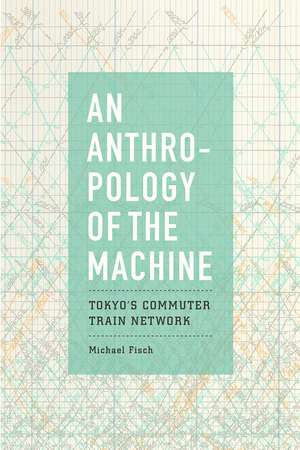An Anthropology of the Machine: Tokyo's Commuter Train Network
Autor Michael Fischen Limba Engleză Paperback – 19 iun 2018
With its infamously packed cars and disciplined commuters, Tokyo’s commuter train network is one of the most complex technical infrastructures on Earth. In An Anthropology of the Machine, Michael Fisch provides a nuanced perspective on how Tokyo’s commuter train network embodies the lived realities of technology in our modern world. Drawing on his fine-grained knowledge of transportation, work, and everyday life in Tokyo, Fisch shows how fitting into a system that operates on the extreme edge of sustainability can take a physical and emotional toll on a community while also creating a collective way of life—one with unique limitations and possibilities.
An Anthropology of the Machine is a creative ethnographic study of the culture, history, and experience of commuting in Tokyo. At the same time, it is a theoretically ambitious attempt to think through our very relationship with technology and our possible ecological futures. Fisch provides an unblinking glimpse into what it might be like to inhabit a future in which more and more of our infrastructure—and the planet itself—will have to operate beyond capacity to accommodate our ever-growing population.
An Anthropology of the Machine is a creative ethnographic study of the culture, history, and experience of commuting in Tokyo. At the same time, it is a theoretically ambitious attempt to think through our very relationship with technology and our possible ecological futures. Fisch provides an unblinking glimpse into what it might be like to inhabit a future in which more and more of our infrastructure—and the planet itself—will have to operate beyond capacity to accommodate our ever-growing population.
Preț: 156.73 lei
Preț vechi: 186.32 lei
-16% Nou
Puncte Express: 235
Preț estimativ în valută:
29.99€ • 31.12$ • 25.07£
29.99€ • 31.12$ • 25.07£
Carte indisponibilă temporar
Doresc să fiu notificat când acest titlu va fi disponibil:
Se trimite...
Preluare comenzi: 021 569.72.76
Specificații
ISBN-13: 9780226558554
ISBN-10: 022655855X
Pagini: 320
Ilustrații: 27 halftones
Dimensiuni: 152 x 229 x 23 mm
Greutate: 0.52 kg
Ediția:1
Editura: University of Chicago Press
Colecția University of Chicago Press
ISBN-10: 022655855X
Pagini: 320
Ilustrații: 27 halftones
Dimensiuni: 152 x 229 x 23 mm
Greutate: 0.52 kg
Ediția:1
Editura: University of Chicago Press
Colecția University of Chicago Press
Notă biografică
Michael Fisch is assistant professor of anthropology at the University of Chicago.
Cuprins
Preface
Introduction: Toward a Theory of the MachineChapter 1: Finessing the Interval
Chapter 2: Inhabiting the Interval
Chapter 3: Operation without Capacity
Chapter 4: Gaming the Interval
Chapter 5: Forty-Four Minutes
Chapter 6: Ninety Seconds
Conclusion: Reflections on the Gap
Acknowledgments
Bibliography
Index
Bibliography
Index
Recenzii
“In this lucid, passionate, and engaging book, Fisch plunges us into the mundane worlds of railway commuters in Tokyo. Focusing on the connections between unforgiving timetables, speeding trains, and enduring travelers, he shows us how the cultivation of indeterminacy between people and machines has become essential to the smooth running of a highly stressed infrastructure. Through an investigation of railway accidents, corporate profits and driver error, mortality, and media, Fisch helps us imagine a more mutually responsive and hopeful relationship between people, machines, and the technical systems of modernity.”
“Fisch's remarkable book takes us into the web of Tokyo's hyper-massive train network, as his technography shows us how to mind the gap between communication and transportation, technicity and technology, life and death. Fisch has produced not only a strikingly original study of an emergent mode of techno-social organization, but also a powerful meditation on ethical responsibility for our contemporary technological condition.”
“Setting Gilbert Simondon’s philosophy of technology on a collision course with anthropology, Fisch produces a theoretical explosion whose effects will be registered in many disciplines for many years. An Anthropology of the Machine not only sets forth a bold new theory of the machine that overturns how we think about the relation between culture and technology. It also offers a mode of ethnographic inquiry as intricately machinated as the Tokyo commuter train network. Fisch rediscovers how anthropology, like the machine, works best when it runs amok.”
“...the book ultimately rewards its readers with a thought-provoking and generous framework for understanding and assessing the Tokyo commuter railway system, with major implications for examining other human-technology ensembles.”
"This book is a signal for the coming field of technology studies that will interest not only anthropologists but also the wide range of researchers from risk management to pop-culture studies."
